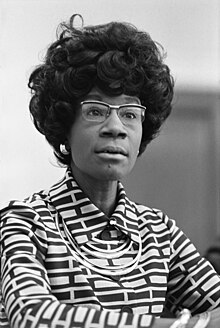 Global Information
Global InformationAfrican Americans in the United States Congress information
| This article is part of a series on the |
| Politics of the United States |
|---|
 |
|


From the first United States Congress in 1789 through the 116th Congress in 2020, 162 African Americans served in Congress.[1] Meanwhile, the total number of all individuals who have served in Congress over that period is 12,348.[2] Between 1789 and 2020, 152 have served in the House of Representatives, 9 have served in the Senate, and 1 has served in both chambers. Voting members have totaled 156, with 6 serving as delegates. Party membership has been 131 Democrats and 31 Republicans. While 13 members founded the Congressional Black Caucus in 1971 during the 92nd Congress, in the 116th Congress (2019-2020), 56 served, with 54 Democrats and 2 Republicans (total seats are 535, plus 6 delegates).[1]
By the time of the first edition of the House sponsored book, Black Americans in Congress, in the bicentennial year of 1976, 45 African Americans had served in Congress throughout history; that rose to 66 by the second edition in 1990, and there were further sustained increases in both the 2008 and 2018 editions.[3] The first African American to serve was Senator Hiram Revels in 1870. The first African American to chair a congressional committee was Representative William L. Dawson in 1949. The first African-American woman was Representative Shirley Chisholm in 1968, and the first African American to become Dean of the House was John Conyers in 2015. The first African American to become party leader in either chamber of congress was Hakeem Jeffries in 2023. One member, then Senator Barack Obama, went from the Senate to President of the United States in 2009.
The first African Americans to serve in the Congress were Republicans elected during the Reconstruction Era. After the 13th and 14th Amendments granted freedom and citizenship to enslaved people, freedmen gained political representation in the Southern United States for the first time.[4][5][6] In response to the growing numbers of black statesmen and politicians, white Democrats turned to violence and intimidation to regain their political power.[7]
By the presidential election of 1876, only three state legislatures were not controlled by whites. The Compromise of 1877 completed the period of Redemption by white Southerners, with the withdrawal of federal troops from the South. State legislatures began to pass Jim Crow laws to establish racial segregation and restrict labor rights, movement, and organizing by black people. They passed some laws to restrict voter registration, aimed at suppressing the black vote. From 1890 to 1908, state legislatures in the South essentially disfranchised most black people and many poor white people from voting by passing new constitutions or amendments or other laws related to more restrictive electoral and voter registration and electoral rules. As a result of the Civil Rights Movement, the U.S. Congress passed laws in the mid-1960s to end segregation and enforce constitutional civil rights and voting rights.
As Republicans accommodated the end of Reconstruction becoming more ambiguous on civil rights and with the rise of the Republican lily-white movement, African Americans began shifting away from the Republican Party.[8] During two waves of massive migration within the United States in the first half of the 20th century, more than six million African Americans moved from the South to Northeastern, Midwestern, and Western industrial cities, with five million migrating from 1940 to 1970. Some were elected to federal political office from these new locations, and most were elected as Democrats. During the Great Depression, many black voters switched allegiances from the Republican Party to the Democratic Party, in support of the New Deal economic, social network and work policies of Franklin D. Roosevelt's administration. This trend continued through the 1960s civil rights legislation, when voting rights returned to the South, to present.
- ^ a b Brudnick, Ida A.; Manning, Jennifer E. (January 22, 2020). African American Members of the U.S. Congress: 1870-2019 (PDF) (Report). Congressional Research Service. pp. 1, 5.
- ^ "Total Members of the House & State Representation - US House of Representatives: History, Art & Archives". history.house.gov. Retrieved 2020-08-14.
- ^ "The Historiography of Black Americans in Congress | US House of Representatives: History, Art & Archives". history.house.gov. Retrieved 2020-08-13.
- ^ Thirteenth Amendment of the Constitution of United States (1865)
- ^ Fourteenth Amendment of the Constitution of United States (1865)
- ^ "x-index :: Reconstruction :: Politics :: Lest We Forget". lestweforget.hamptonu.edu. Retrieved 2021-03-13.
- ^ "Southern Violence During Reconstruction | American Experience | PBS". www.pbs.org. Retrieved 2021-03-13.
- ^ "Party Realignment - US House of Representatives: History, Art & Archives". history.house.gov. Retrieved 2020-06-24.